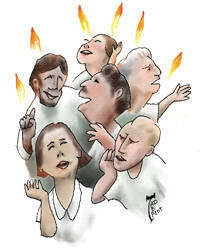The Spirit's Gift
Pentecost should overwhelm us as profoundly as it overwhelmed the disciples. Let’s start with them and move to us. The disciples gathered on the Jewish feast of Pentecost, the commemoration of the gift of God’s law on Sinai. Recall how powerfully God was experienced in the Exodus, guiding his people with a pillar of fire at night and with overwhelming power on Sinai itself. Pentecost celebrates the law as Israel’s particular gift from God: “He proclaims his word to Jacob, his statutes and laws to Israel. He has not done this for any other nation” (Ps 147:19-20).
Recall too how John the Baptist prophesied a baptism “with the Holy Spirit and fire” (Lk 3:16). It was on this great feast day that God fulfilled John’s prophesy and brought that same Spirit and fire to the disciples. Today’s reading from the Acts of the Apostles describes it: “And suddenly there came from the sky a noise like a strong driving wind.... Then there appeared to them tongues as of fire, which parted and came to rest on each one of them. And they were all filled with the Holy Spirit and began to speak in different tongues.” This enabled everyone present, including visitors representing many cultures and languages, to “hear them speaking in our own tongues of the mighty acts of God.” Here we should think not of the kind of ecstatic prayer Paul addresses in 1 Cor 14, but of an expression of the Gospel going universal. The gift of the Spirit is the final act of the paschal mystery, the final reversal. Just as Christ reversed the curse of Adam, so the Spirit reversed the curse of the tower of Babel, where, due to unrestrained human hubris, God divided humans by different languages and they became incomprehensible to each other. The Spirit now unites, and the church is missioned to the whole world, for God’s love and salvation have claimed everyone.
This final act of the paschal mystery now completes Easter with the ultimate divine dispensation: the gift of the Holy Spirit as ours. The center of the universe has now become our center; God is literally ours. This is the point of today’s second reading from Galatians. Paul had been arguing for Christian freedom from the law of Moses. The law was holy; it trained and disciplined us well until Christ came, but now that time is over (Gal 3:24). Now is the time of the Spirit. This is our portion.
With this in mind, Paul contrasts the works of the flesh with the fruit of the Spirit. Here flesh (sarx) refers not to the body (soma) but to the soul as dominated by the passions. Paul’s list of these works includes everything from sexual immorality to idolatry to conflict among people. The issue of conflict dominates: “enmities, strife, jealousy, anger, quarrels, dissensions, factions, envy....” Contrast this with the fruits of the Spirit, which include “love, joy, peace, patience, kindness, generosity, faithfulness, gentleness, self-control.” Notice that Paul is contrasting works of the flesh with fruits of the Spirit. That is, these latter qualities are evidence of the already active Spirit within. Paul’s aim is not to prescribe virtuous activities to perform. Rather, he is pointing out what the Spirit looks like.
Everyone knows people whose external lives are morally ordered but whose minds are stubborn, with myopic views, and with hearts narrow or cold. I fear such people may come to the kingdom’s gates and hear, “I never knew you” (Mt 7:33). Paul reminds us, “If you are guided by the Spirit, you are not under the law.” The law is about obedience, but the Spirit is about love and communion. And those who are alive with the Spirit naturally express the fruit of that communion.
When we chant the hymn Veni, Sancte Spiritus, we seek for what we already have, but have yet to fully realize in our lives. Of course, we can thwart or remain obtuse to the Spirit’s activity, but we should not deny that the Spirit is our possession. Is this not overwhelming news? It is all gift, but the gift has been assured. If we have not yet opened it up, now is the time.
This article also appeared in print, under the headline “The Spirit's Gift,” in the May 21, 2012, issue.








